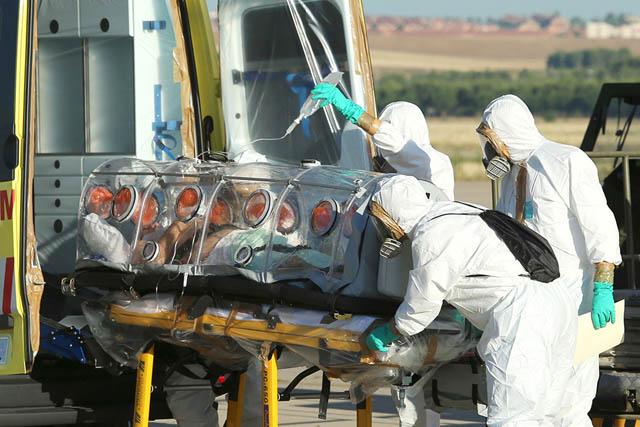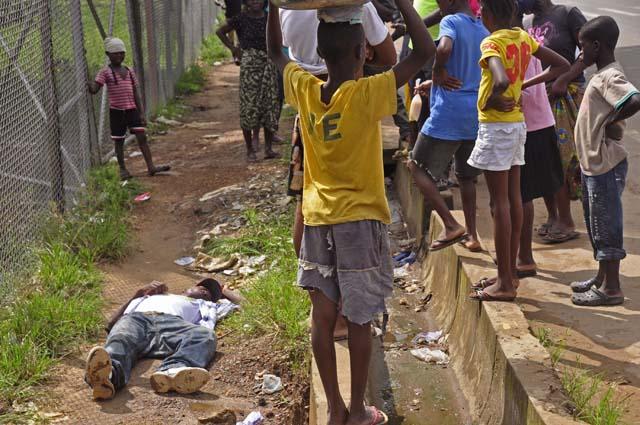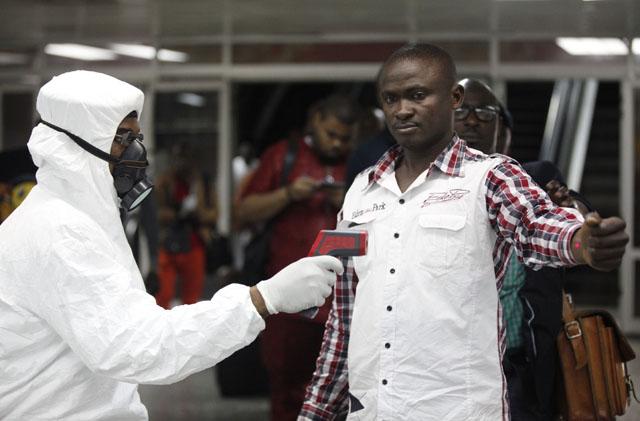You are here
WHO meets on experimental Ebola drug use
By AFP - Aug 11,2014 - Last updated at Aug 11,2014

GENEVA — As the world scrambles to stem the rapid spread of the killer Ebola virus, the World Health Organisation hosted a meeting on Monday to discuss the ethics of using experimental drugs.
The talks come as countries ravaged by the tropical disease in west Africa were gripped by panic, with drastic containment measures causing transport chaos, price hikes and food shortages, and stoking fears that people could die of hunger.
Liberia, where Ebola has already claimed over almost 370 lives, placed a third province, Lofa, under quarantine on Monday after similar measures in Bomba and Grand Cape Mount.
“From now on, no one will be allowed to go to Lofa, no one will come out of there,” President Ellen Johnson Sirfleaf said. “We want to protect areas that have not been yet affected.”
There is currently no available cure or vaccine for Ebola, one of the deadliest viruses known to man, and with the death toll fast approaching 1,000, the WHO has declared the latest outbreak a global public health emergency.
But the use of experimental drugs has opened up an intense ethical debate, and medical experts from around the world joined WHO-hosted discussions on Monday to draft guidelines for using non-authorised medicines in emergencies such as Ebola.
Two Americans and a Spanish priest infected with the virus while working with the sick in Africa are being treated with an untested drug called ZMapp, which has reportedly shown promising results.
But the drug, made by private US company Mapp Pharmaceuticals, is still in an extremely early phase of development and had only been tested previously on monkeys.
Ethical thing to do?
ZMapp is in extremely short supply, but its use on Western aid workers has sparked controversy and demands that it be made available in Africa, where Guinea, Liberia and Sierra Leone are the hardest hit nations.
“Is it ethical to use unregistered medicines to treat people, and if so, what criteria should they meet and what conditions, and who should be treated?” said WHO assistant director-general Marie-Paule Kieny ahead of Monday’s meeting.
“What is the ethical thing to do?”
While impoverished Guinea, Liberia and Sierra Leone account for the bulk of the cases, the latest outbreak has spread further afield. Nigeria, Africa’s most populous country, has so far counted two deaths.
Numerous countries have imposed a raft of emergency measures, including flight bans or screening of passengers.
In the latest such move, the Ivory Coast announced on Monday it was banning all flights from the three hardest-hit nations.
And it said in the past few days it had turned back around 100 Liberians trying to flee across the border into Ivory Coast, which not reported any Ebola cases.
Togo, which also has yet to confirm any cases, said it had strengthened health screenings, but people in the capital Lome are far from reassured.
‘Everyone is afraid’
“It’s a general psychosis. Everyone is afraid. For the past three days, I haven’t said greet anyone,” student Paul Magnissou told AFP.
Ebola causes fever and, in the worst cases, unstoppable bleeding and can be fatal in 25 to 90 per cent of cases, according to the WHO.
The virus spreads by close contact with an infected person through bodily fluids such as sweat, blood and tissue.
The latest outbreak — which the WHO says is by far the worst since Ebola was discovered four decades ago — has killed around 55-60 per cent of those infected.
On Saturday, the WHO said clinical trials of Ebola vaccines could begin within weeks and be ready for widespread use by early next year.
In the meantime, there is only a handful of available treatments and it remains unclear how quickly production could be ramped up.
As WHO engages with pharmaceutical companies and governments to try to speed up the development process of vaccines and drugs, it is faced with a range of pressing ethical questions.
Should anyone infected with the virus be given experimental treatments? And what about those who have been exposed, or who could easily become exposed due to their work, such as healthcare workers?
Monday’s meeting, whose conclusions are due for release on Tuesday, will also look at how far testing should progress before an experimental drug can be provided, said Kieny.
Kieny said the session would only address the principles and provide urgent guidance to the WHO, and that another meeting would be held to go into further detail.
Related Articles
The World Health Organisation authorised the use of experimental drugs in the fight against Ebola on Tuesday as the death toll topped 1,000 and a Spanish priest became the first European to succumb to the latest outbreak of the virus.
Liberia battled on Tuesday to halt the spread of the Ebola disease in its crowded, run-down oceanside capital Monrovia, recording the most new deaths as fatalities from the world's worst outbreak of the deadly virus rose above 1,200.
Nigeria became the latest country to declare a national emergency over the deadly Ebola virus on Friday, as the World Health Organisation (WHO) called the epidemic that has claimed nearly 1,000 lives a global health crisis.



















